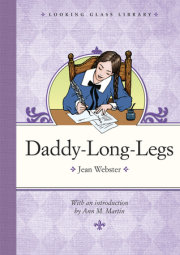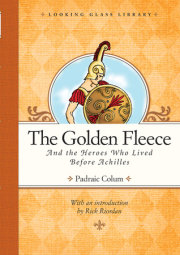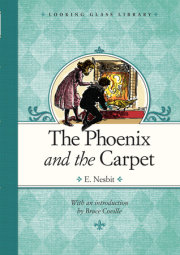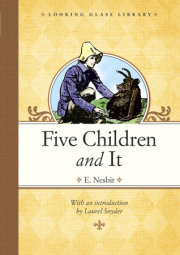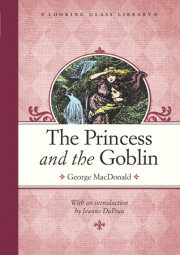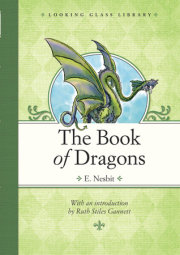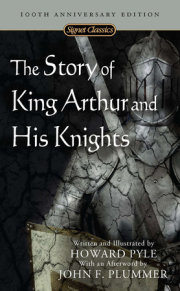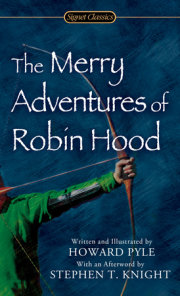1
THE STOOL OF FORTUNE
Once upon a time there came a soldier marching along the road, kicking up a little cloud of dust at each step--as strapping and merry and bright-eyed a fellow as you would wish to see on a summer day. Tramp! tramp! tramp! he marched, whistling as he jogged along, though he carried a heavy musket over his shoulder and though the sun shone hot and strong and there was never a tree in sight to give him a bit of shelter. At last he came in sight of the King's Town and to a great field of stocks and stones, and there sat a little old man as withered and brown as a dead leaf, and clad all in scarlet from head to foot.
"Ho! soldier," said he, "are you a good shot?"
"Aye," said the soldier, "that is my trade."
"Would you like to earn a dollar by shooting off your musket for me?"
"Aye," said the soldier, "that is my trade also."
"Very well, then," said the little man in red, "here is a silver button to drop into your gun instead of a bullet. Wait you here, and about sunset there will come a great black bird flying. In one claw it carries a feather cap and in the other a round stone. Shoot me the silver button at that bird, and if your aim is good it will drop the feather cap and the pebble. Bring them to me to the great town-gate and I will pay you a dollar for your trouble."
"Very well," said the soldier, "shooting my gun is a job that fits me like an old coat." So, down he sat and the old man went his way.
Well, there he sat and sat and sat and sat until the sun touched the rim of the ground, and then, just as the old man said, there came flying a great black bird as silent as night. The soldier did not tarry to look or to think. As the bird flew by up came the gun to his shoulder, squint went his eye along the barrel--Puff! Bang!--
I vow and declare that if the shot he fired had cracked the sky he could not have been more frightened. The great black bird gave a yell so terrible that it curdled the very blood in his veins and made his hair stand upon end. Away it flew like a flash--a bird no longer, but a great, black demon, smoking and smelling most horribly of brimstone, and when the soldier gathered his wits, there lay the feather cap and a little, round, black stone upon the ground.
"Well," said the soldier, "it is little wonder that the old man had no liking to shoot at such game as that." And thereupon he popped the feather cap into one pocket and the round stone into another, and shouldering his musket marched away until he reached the town-gate, and there was the old man waiting for him.
"Did you shoot the bird?" said he.
"I did," said the soldier.
"And did you get the cap and the round stone?"
"I did."
"Then here is your dollar."
"Wait a bit," said the soldier, "I shot greater game that time than I bargained for, and so it's ten dollars and not one you shall pay me before you lay finger upon the feather cap and the little stone."
"Very well," said the old man, "here are ten dollars."
"Ho! ho!" thought the soldier, "is that the way the wind blows?"--"Did I say ten dollars?" said he; "'Twas a hundred dollars I meant."
At that the old man frowned until his eyes shone green. "Very well," said he, "if it is a hundred dollars you want, you will have to come home with me, for I have not so much with me." Thereupon he entered the town with the soldier at his heels.
Up one street he went and down another, until at last he came to a great, black, ancient, ramshackle house; and that was where he lived. In he walked without so much as a rap at the door, and so led the way to a great room with furnaces and books and bottles and jars and dust and cobwebs, and three grinning skulls upon the mantelpiece, each with a candle stuck atop of it, and there he left the soldier while he went to get the hundred dollars.
The soldier sat him down upon a three-legged stool in the corner and began staring about him; and he liked the looks of the place as little as any he had seen in all of his life, for it smelled musty and dusty, it did: the three skulls grinned at him, and he began to think that the little old man was no better than he should be. "I wish," said he, at last, "that instead of being here I might be well out of my scrape and in a safe place."
Now the little old man in scarlet was a great magician, and there was little or nothing in that house that had not some magic about it, and of all things the three-legged stool had been conjured the most.
"I wish that instead of being here I might be well out of my scrape, and in a safe place." That was what the soldier said; and hardly had the words left his lips when--whisk! whir!--away flew the stool through the window, so suddenly that the soldier had only just time enough to grip it tight by the legs to save himself from falling. Whir! whiz!--away it flew like a bullet. Up and up it went--so high in the air that the earth below looked like a black blanket spread out in the night; and then down it came again, with the soldier still gripping tight to the legs, until at last it settled as light as a feather upon a balcony of the king's palace; and when the soldier caught his wind again he found himself without a hat, and with hardly any wits in his head.
There he sat upon the stool for a long time without daring to move, for he did not know what might happen to him next. There he sat and sat, and by-and-by his ears got cold in the night air, and then he noticed for the first time that he had lost his head gear, and bethought himself of the feather cap in his pocket. So out he drew it and clapped it upon his head, and then--lo and behold!--he found he had become as invisible as thin air--not a shred or a hair of him could be seen. "Well!" said he, "here is another wonder, but I am safe now at any rate." And up he got to find some place not so cool as where he sat.
He stepped in at an open window, and there he found himself in a beautiful room, hung with cloth of silver and blue, and with chairs and tables of white and gold; dozens and scores of waxlights shone like so many stars, and lit every crack and cranny as bright as day, and there at one end of the room upon a couch, with her eyelids closed and fast asleep, lay the prettiest princess that ever the sun shone upon. The soldier stood and looked and looked at her, and looked and looked at her, until his heart melted within him like soft butter, and then he kissed her.
"Who is that?" said the princess, starting up, wide-awake, but not a soul could she see, because the soldier had the feather cap upon his head.
"Who is that?" said she again; and then the soldier answered, but without taking the feather cap from his head.
"It is I," said he, "and I am King of the Wind, and ten times greater than the greatest of kings here below. One day I saw you walking in your garden and fell in love with you, and now I have come to ask you if you will marry me and be my wife?"
"But how can I marry you?" said the princess, "without seeing you?"
"You shall see me," said the soldier, "all in good time. Three days from now I will come again, and will show myself to you, but just now it cannot be. But if I come, will you marry me?"
"Yes I will," said the princess, "for I like the way you talk--that I do!"
Thereupon the soldier kissed her and said good-bye, and then stepped out of the window as he had stepped in. He sat him down upon his three-legged stool. "I wish," said he, "to be carried to such and such a tavern." For he had been in that town before, and knew the places where good living was to be had.
Whir! whiz! Away flew the stool as high and higher than it had flown before, and then down it came again, and down and down until it lit as light as a feather in the street before the tavern door. The soldier tucked his feather cap in his pocket, and the three-legged stool under his arm, and in he went and ordered a pot of beer and some white bread and cheese.
Meantime, at the king's palace was such a gossiping and such a hubbub as had not been heard there for many a day; for the pretty princess was not slow in telling how the invisible King of the Wind had come and asked her to marry him; and some said it was true and some said it was not true, and everybody wondered and talked, and told their own notions of the matter. But all agreed that three days would show whether what had been told was true or no.
As for the soldier, he knew no more how to do what he had promised to do than my grandmother's cat; for where was he to get clothes fine enough for the King of the Wind to wear? So there he sat on his three-legged stool thinking and thinking, and if he had known all that I know he would not have given two turns of his wit upon it. "I wish," said he, at last--"I wish that this stool could help me now as well as it can carry me through the sky. I wish," said he, "that I had a suit of clothes such as the King of the Wind might really wear."
The wonders of the three-legged stool were wonders indeed!
Hardly had the words left the soldier's lips when down came something tumbling about his ears from up in the air; and what should it be but just such a suit of clothes as he had in his mind--all crusted over with gold and silver and jewels.
"Well," said the soldier, as soon as he had got over his wonder again, "I would rather sit upon this stool than any I ever saw." And so would I, if I had been in his place, and had a few minutes to think of all that I wanted.
So he found out the trick of the stool, and after that wishing and having were easy enough, and by the time the three days were ended the real King of the Wind himself could not have cut a finer figure. Then down sat the soldier upon his stool, and wished himself at the king's palace. Away he flew through the air, and by-and-by there he was, just where he had been before. He put his feather cap upon his head, and stepped in through the window, and there he found the princess with her father, the king, and her mother, the queen, and all the great lords and nobles waiting for his coming; but never a stitch nor a hair did they see of him until he stood in the very midst of them all. Then he whipped the feather cap off of his head, and there he was, shining with silver and gold and glistening with jewels--such a sight as man's eyes never saw before.
"Take her," said the king, "she is yours." And the soldier looked so handsome in his fine clothes that the princess was as glad to hear those words as any she had ever listened to in all of her life.
"You shall," said the king, "be married tomorrow."
"Very well," said the soldier. "Only give me a plot of ground to build a palace upon that shall be fit for the wife of the King of the Wind to live in."
"You shall have it," said the king, "and it shall be the great parade ground back of the palace, which is so wide and long that all my army can march round and round in it without getting into its own way; and that ought to be big enough."
"Yes," said the soldier, "it is." Thereupon he put on his feather cap and disappeared from the sight of all as quickly as one might snuff out a candle.
He mounted his three-legged stool and away he flew through the air until he had come again to the tavern where he was lodging. There he sat him down and began to churn his thoughts, and the butter he made was worth the having, I can tell you. He wished for a grand palace of white marble, and then he wished for all sorts of things to fill it--the finest that could be had. Then he wished for servants in clothes of gold and silver, and then he wished for fine horses and gilded coaches. Then he wished for gardens and orchards and lawns and flower-plants and fountains, and all kinds and sorts of things, until the sweat ran down his face from hard thinking and wishing. And as he thought and wished, all the things he thought and wished for grew up like soap-bubbles from nothing at all.
Then, when day began to break, he wished himself with his fine clothes to be in the palace that his own wits had made, and away he flew through the air until he had come there safe and sound.
But when the sun rose and shone down upon the beautiful palace and all the gardens and orchards around it, the king and queen and all the court stood dumb with wonder at the sight. Then, as they stood staring, the gates opened and out came the soldier riding in his gilded coach with his servants in silver and gold marching beside him, and such a sight the daylight never looked upon before that day.
Well, the princess and the soldier were married, and if no couple had ever been happy in the world before, they were then. Nothing was heard but feasting and merrymaking, and at night all the sky was lit with fireworks. Such a wedding had never been before, and all the world was glad that it had happened.
Copyright © 2010 by Howard Pyle. All rights reserved. No part of this excerpt may be reproduced or reprinted without permission in writing from the publisher.



